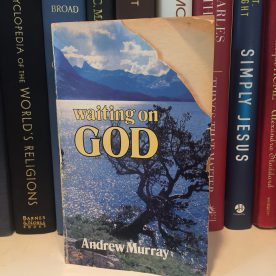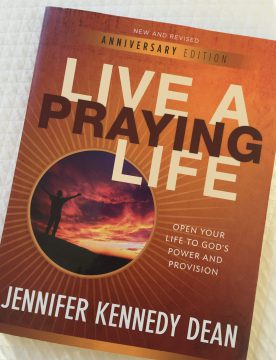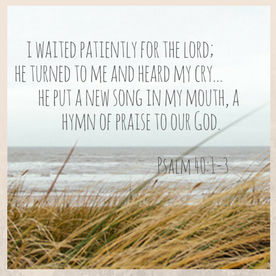I used to write financial planning books.
(I know, I know. Insert eye-roll emoji. Robbie would.)
I didn’t think up the money management stuff on my own; I mostly just wrote down whatever Ron Blue or Larry Burkett said, and then added some semi-colons. And while I don’t remember everything I learned from those gurus (like, if you asked me what a “pour-over will” is now, I’d probably reach for the corkscrew), there are at least three truths that have stuck:
First: God owns it all. (Helpful to remember, especially when you think about tithing. Or buying a house. Or even a new pair of shoes. Would God do that with your/His paycheck?)
Second: Financial freedom comes from spending less than you earn. (Harder than it sounds. See earlier note re shoes.)
And finally: Time is a tool–and the more you have of it, the better.
That last point, the one about time being our ally, also holds true in prayer. Just like extending our time horizon in financial planning can allow the “magic” of compounding to exponentially grow a nest egg, so giving God time to work in response to our prayers releases Him to do more–immeasurably more–than anything we might think we desire.
And just like taking the long view in our finances can help us ride the market’s highs and lows without panicking, so adopting a long-term prayer strategy can help us wait well and keep praying–even when the answer seems slow in coming.
Which happens, right? In every season of prayer…
The toddler who won’t sleep through the night. The teenager battling loneliness. The adult child who has walked away from his faith. The spouse who is looking for work. The sickness–physical or emotional–that just won’t go away.

It can be easy, in the face of delayed provision or unanswered prayers, to want to give up. Maybe, we think to ourselves, God has some secret reason for withholding an answer–and the most pious thing we could do would be to just quit.
But let’s don’t.
Instead, let’s take the long view, recognizing that God is at work–even when we can’t see what he’s doing, and even when the waiting is hard. And I don’t know much about all the ways that God works (less, even, than I know about handling money), but here again, there are three things that are true:
First: God loves us. Lavishly and without condition, even on our worst days.
Second: He is all-powerful. It doesn’t matter what our need is; he is able to help.
And finally: His timing is perfect.
God might be timing things so we learn perseverance. That’s a quality I want my own kids to have; seems like God might want it to shape our lives, too. Sure, I love it when prayer works like a vending machine (request in; answer out), but honestly? The blessings that come after a hard fight or a long wait are the answers I treasure the most.
He might be giving us an opportunity to hone our request. Just like earthly parents can get an earful sometimes (one of our kids recently asked for a kitten that comes with its ears folded down, which I gather costs more than some cars), so our Heavenly Father hears all our petitions. Sometimes, though, He has a different idea. (Like, He might want us to get a free cat. Or even no cat.) And when He does, we are wise to follow Christ’s example and pray not just for what we want, but in submission to God’s better plan.
Or God could be testing our faith. Not so that He can know how we measure up–He already has that intel–but so that we can. We need to know that we’ve staked our trust in something that’s real, that our confidence is well-placed, and that the ties that bind us to Jesus are strong.
God could be doing any number of things while we wait. I don’t know. But let’s not give up. Instead, let’s take the long view, knowing how much He loves us–and recognizing that even though we might not see the whole scope of what God is doing, He makes everything beautiful in its time.
Heavenly Father,
Let us not become weary in prayer, but help us remember that at the proper time, we will reap a harvest if we do not give up. (Galatians 6:9)
Amen.







 This month’s posts and Friday prayers are designed to help us discover the “unbroken enjoyment” of waiting on God as we learn to trust him in the sometimes unexpected (or unwanted) circumstances of our lives.
This month’s posts and Friday prayers are designed to help us discover the “unbroken enjoyment” of waiting on God as we learn to trust him in the sometimes unexpected (or unwanted) circumstances of our lives.













